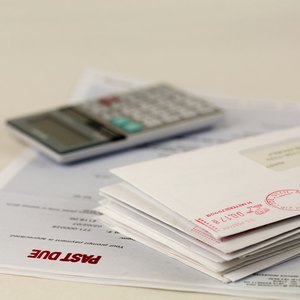
It's true that a charge-off does hurt your credit, but it does not harm it as much as you might think. Unfortunately, that's because most of the damage has already been done by the late payments leading to the charge-off. FICO – the company that produces the credit-scoring software used by credit bureaus – states that late payments account for 35 percent of your credit score. FICO also estimates that a 30-day late payment drops a mid-range credit score – around 680 – by 60 to 80 points. Paying late damages an excellent credit score – about 780 – even more, causing it to decline 90 to 110 points.
Tips
Most of the impact a charge-off has on your credit score comes from the effects of falling behind on your payments. Depending on your current score and credit history, you could see a drop by as much as 60 to 110 points.
What Is a Charge-Off?
When banks lend money or extend credit, the debt shows up on their accounting books as an asset. It has a positive financial value. If loans or credit cards go unpaid, the debts gradually lose value as an asset. Eventually, the Internal Revenue Service makes the bank take the loan off its books. At this point, the bank or lender charges off, or removes, the loan as an asset. It also reports the charge-off to the credit reporting companies.
Credit Scores
Your credit score can range from 300 to 850. Four other factors affect your score in addition to payment history. These include amounts owed (30 percent), length of credit history (15 percent), new credit (10 percent) and types of credit used (10 percent). If your score is 670 or higher, Experian considers this to be good to excellent. As it continues to move below 670, it declines from average to bad. If you need to raise your score, focus first on the scoring factors that impact your score the most.
Effects of Charge-Offs
A charge-off results when you fail to make your credit card or loan payment on time. The point at which the lender charges off the debt is based on accounting regulations. Other than making a payment, there’s nothing you can do to extend the time frame. Typically, a credit card account charges off after you fall six months, or 180 days, behind on your payments. Even though the lender reports your late payments to the credit agencies, the account doesn't show as charged off until this point. So as the account goes from 30 to 60 to 90 to 120 days late, your score suffers a little more each month. By the time it reaches the charge-off point, it decreases a little more.
Paying a Charge-Off
If you pay off a charged-off debt, you'll see little, if any, positive impact on your score right away. However, you should do your best to pay it off if you can. This sends a positive signal to future lenders. As time goes by, the late payments and charge-off have less of an impact on your credit score. After 24 months, the effect is considerably less. So the best payment strategy is to pay the most recent delinquent accounts or charge-offs – those less than two years old – before tackling the older ones. In fact, all charge-offs automatically fall off your report seven years from the date of the charge-off.
References
- MyFICO: How a FICO Score Breaks Down
- Equifax: Can One Late Payment Affect My Credit Score?
- Experian: What Are the Different Credit Scoring Ranges?
- Equifax. "What Is a Charge-Off?" Accessed June 2, 2020.
- Experian. "What Does 'Charge-Off' Mean on a Credit Report?" Accessed June 2, 2020.
- Experian. "Can a Paid Charged Off Account Be Removed From the Report?" Accessed June 2, 2020.
- Federal Trade Commission Consumer Information. "Fair Credit Reporting Act § 605. Requirements Relating to Information Contained in Consumer Reports," Page 22. Accessed June 2, 2020.
- Federal Trade Commission Consumer Information. "Disputing Errors on Credit Reports." Accessed May 31, 2020.
- MyFico. "What Is Amounts Owed?" Accessed June 2, 2020.
- Lexington Law. "Pay for Delete Letter Template for Credit Repair." Accessed June 2, 2020.
- Consumer Financial Protection Bureau. "Is It Possible to Remove Accurate, Negative Information From My Credit Report?" Accessed June 2, 2020.
Writer Bio
Chris Brantley began writing professionally for a financial analysis firm in 1997. From 2000 to 2004, he worked as a financial advisor, specializing in retirement planning and earned his Series 7, Series 66 and insurance licenses. Brantley started his full-time writing career in 2012 and has written for a variety of financial websites, including insurance, real estate, loan and investment sites. He holds a Bachelor of Arts in English from the University of Georgia.

